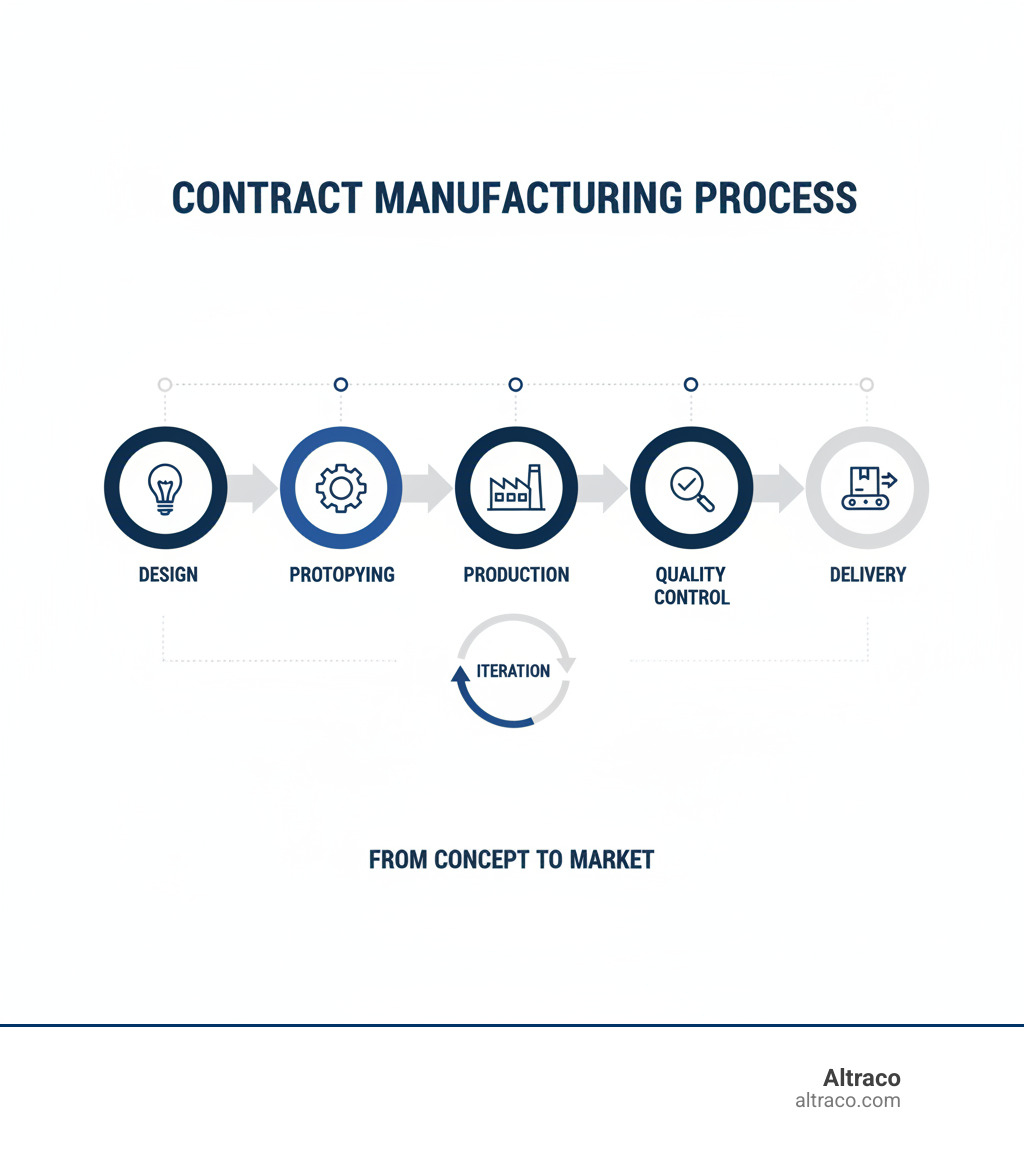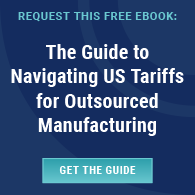Why Finding the Right Contract Manufacturing Services Matters
Contract manufacturing services allow companies to outsource the production of components or finished goods to specialized third-party manufacturers. Finding the right partner is crucial, as poor selection can lead to quality issues, supply chain disruptions, and financial losses, especially for large enterprises.
The process involves defining your requirements (specs, volume, quality standards), researching partners, requesting quotes, conducting audits, and negotiating agreements. Key selection criteria include technical capabilities, quality certifications like ISO 9001, a proven track record, and strong intellectual property (IP) protections.
The global contract manufacturing industry is projected to grow at 10% annually, reflecting how companies in sectors from automotive parts to sporting goods are leveraging specialized manufacturers to reduce costs and accelerate time-to-market. The challenge is finding the right partner, especially for offshore manufacturing in countries like China, Mexico, or Vietnam, where tariffs and quality control add complexity.
I’m Albert Brenner, co-owner of Altraco. With over 40 years of experience, I’ve helped Fortune 500 companies steer the complexities of contract manufacturing services for home improvement, sporting goods, and automotive products. My firm specializes in offshore manufacturing partnerships that deliver quality, on-time delivery, and significant cost savings.

Understanding Contract Manufacturing: The Foundation for Growth
Instead of building a factory, you can use contract manufacturing services to bring a product to life without owning production facilities. This strategic partnership is how smart companies scale efficiently in today’s global economy.
What is Contract Manufacturing?
Contract manufacturing is a service agreement where you, the Original Equipment Manufacturer (OEM), hire a third-party manufacturer to produce your product to your exact specifications. A contract manufacturer (CM) is a manufacturer that contracts with a firm for components or products, acting as an extension of your team.
This differs from general outsourcing, which can apply to any business function. It is also distinct from private labeling, where you put your brand on a pre-existing product. With contract manufacturing, you own the intellectual property and design.
At Altraco, we help you manage this process across multiple countries. Whether manufacturing in Mexico, China, or Vietnam, we handle the complexity so you can focus on your business. Learn more about our services.
Key Differences: Contract Manufacturing vs. In-House Production
The choice between in-house production and contract manufacturing is a strategic one. In-house gives you total operational control but requires massive capital investment in facilities and staff. Contract manufacturing leverages a partner’s existing infrastructure, offering several advantages:
- Product Ownership and Control: You always retain design and brand ownership. With a CM, you delegate operational control while protecting your intellectual property through strong agreements.
- Scalability: Scaling production up or down is far simpler with a CM, who can adjust capacity without you needing to buy equipment or change staffing levels.
- Focus on Core Competencies: By offloading production, your team can concentrate on innovation, design, and market strategy—the activities that differentiate your business.
- Risk Mitigation: You share production risks like equipment failure and supply chain disruptions with your manufacturing partner, though this requires clear agreements.
Common Models of Contract Manufacturing
Contract manufacturing is not one-size-fits-all. The right model depends on your product’s complexity and your desired level of control.
- Turnkey Manufacturing: The most comprehensive model. You provide the design, and the manufacturer handles everything from sourcing materials to production, assembly, and logistics, delivering a market-ready product.
- Component Manufacturing: Outsource the production of a specific component that requires specialized equipment, such as a precision-machined part, while you handle final assembly.
- End-to-End Manufacturing: A collaborative partnership where the manufacturer contributes to design refinement and process optimization, leveraging their expertise to improve your product.
- Labor Subcontracting: Outsource a specific process, like CNC machining or metal fabrication, that you cannot perform in-house.

The Strategic Advantages and Common Industries
Partnering with the right provider of contract manufacturing services offers a competitive edge that extends beyond simple cost savings. It’s a strategic decision that can transform your business operations.
Primary Benefits of Using Contract Manufacturing Services
- Reduced Capital Investment: Avoid spending millions on facilities, equipment, and a large production workforce. This frees up capital for product development, marketing, and brand building.
- Access to Specialized Skills: Gain immediate access to advanced technology and expert teams who have perfected their craft, whether it’s CNC machining for automotive parts or composite material work for sporting goods.
- Economies of Scale: Benefit from your manufacturer’s bulk purchasing power for raw materials. They can also scale production up or down to meet demand, providing flexibility that is difficult to achieve in-house.
- Faster Time-to-Market: A good contract manufacturer has the facility, equipment, and workforce ready to go, turning a multi-year setup process into a matter of months or even weeks.
- Focus on Core Competencies: Your team can concentrate on innovation, design, and customer relationships instead of managing a factory floor. Understanding manufacturing terminology in the global supply chain helps leverage these advantages.
Potential Risks and How to Mitigate Them
Successful partnerships require acknowledging and addressing potential challenges.
- Loss of Control: Mitigate this by establishing clear contracts with performance metrics, conducting regular audits, and maintaining constant communication. At Altraco, we act as your eyes and ears on the ground in Mexico, China, or Vietnam.
- Intellectual Property (IP) Risk: Protect your designs with robust Non-Disclosure Agreements (NDAs) and manufacturing contracts that clearly define IP rights. Work with reputable partners who respect IP.
- Quality Consistency: Prevent quality drift by defining stringent standards, requiring regular quality reports, and performing rigorous inspections. Our guide on managing quality issues in manufacturing offers practical strategies.
- Communication Barriers: Bridge time zones, language, and cultural differences with a partner like Altraco. Our teams are fluent in local languages and ensure nothing is lost in translation.
- Partner Dependency: Avoid over-reliance on a single supplier by developing backup relationships and regularly assessing your manufacturer’s financial and operational stability.
Industries That Thrive with Contract Manufacturing
Contract manufacturing is invaluable across numerous sectors where specialized capabilities are essential.
- Automotive Parts: CMs provide advanced CNC machining and metal fabrication to meet the industry’s stringent precision and quality standards.
- Sporting Goods: Brands leverage CMs for expertise in advanced materials and specialized assembly processes to create innovative, high-performance equipment.
- Outdoor Products: For products that demand durability, CMs offer robust manufacturing with diverse materials and rigorous testing.
- Home Improvement: CMs help brands produce a wide range of well-engineered and competitively priced tools, hardware, and fixtures.
- Electrical and Electronic Components: This fast-growing sector relies on CMs for everything from printed circuit boards to complex electronic assemblies.
- Medical Devices: Specialized contract manufacturers provide the sterile environments and regulatory compliance necessary for medical innovation.
How to Choose the Right Contract Manufacturing Partner: A 5-Step Process
Finding the right partner for contract manufacturing services is about finding a true collaborator. This five-step process removes the guesswork and sets the foundation for a successful, long-term partnership. For more detailed guidance, read our article on Choosing a Contract Manufacturer: Pro Tips.
Step 1: Define Your Project Requirements
Before contacting any manufacturers, clearly document your needs. A thorough definition prevents misunderstandings and ensures you receive accurate quotes.
- Product Specifications: Create detailed drawings, a complete Bill of Materials (BOM), and define all dimensions, materials, finishes, and critical tolerances.
- Production Volume: Estimate your initial and ongoing order quantities to find a manufacturer whose capacity matches your needs.
- Target Cost: Establish a realistic per-unit cost that aligns with your business model, factoring in tooling and setup fees.
- Quality Standards: Specify required certifications (e.g., automotive or safety standards) and testing protocols.
- Timeline: Define your deadlines for prototypes, first production runs, and market launch.
Step 2: Identify and Shortlist Potential Partners
With your requirements defined, begin your search for qualified manufacturers.
- Research: Use online directories, industry networks, and trade shows to find candidates. The best leads often come from referrals from trusted colleagues.
- Consider Offshore Manufacturing: For significant cost savings and access to specialized expertise, explore partners in countries like Mexico, China, and Vietnam. Altraco has trusted factory relationships in these regions and can establish new ones as needed. For domestic options, you might search for Contract Manufacturing California.
- Create a Shortlist: Aim for a list of five to seven potential partners who appear to be a good fit for deeper investigation.
Step 3: Request for Quotation (RFQ) and Initial Vetting
Submit a formal RFQ to your shortlisted candidates. The quality of your RFQ package—including CAD files, BOM, volumes, and quality requirements—directly impacts the quality of the quotes you receive.
- Compare Quotes: Look beyond the per-unit cost. Analyze tooling expenses, minimum order quantities (MOQs), payment terms, and included services.
- Assess Communication: Gauge the responsiveness and professionalism of their team. Good communication now is a strong indicator of a healthy future partnership.
- Check References: Request and contact references for projects similar to yours. Ask about quality, delivery, and problem-solving. Choosing the right manufacturing partner is critical to your business success.
Step 4: Conduct Audits and In-Depth Evaluations
Narrow your list to two or three finalists and perform due diligence to verify their capabilities.
- Facility Tours: Conduct in-person or virtual tours to assess cleanliness, organization, and equipment maintenance. Altraco regularly performs these audits for our clients.
- Quality System Audit: Verify certifications like ISO 9001 and review their inspection protocols, non-conformance procedures, and material traceability systems.
- Technical Capability Assessment: Speak with their engineering team to confirm their expertise with your specific materials and processes, such as precision CNC machining or plastic molding.
- Financial Stability Check: Ensure the manufacturer is financially sound to avoid future production disruptions.
Step 5: Finalize the Manufacturing Agreement
Once you’ve selected a partner, formalize the relationship with a comprehensive legal agreement.
- Contract Negotiation: Work with legal counsel to draft a contract that covers all commercial terms and defines responsibilities.
- IP Protection Clauses: Include clauses that clearly state your ownership of all designs and tooling and prohibit unauthorized use. This is critical for offshore manufacturing.
- Quality Agreement: Detail all quality standards, inspection points, acceptance criteria, and procedures for handling defects.
- Payment Terms and Logistics: Clearly define payment milestones, currency, and responsibilities for shipping, customs, and duties.
Key Factors for Evaluating a Partner’s Contract Manufacturing Services
After shortlisting providers of contract manufacturing services, a deeper evaluation is necessary. A good quote is just the start; you need a partner with the right capabilities, quality commitment, and protective measures for a long-term collaboration.
Assessing Technical Capabilities and Equipment
A manufacturer’s core value is their ability to make your product well. Look beyond general claims and assess their specific equipment and expertise.
- CNC Machining: For precision automotive parts, verify they have multi-axis milling and turning equipment capable of holding tight tolerances.
- Metal Fabrication: For outdoor or home improvement products, ensure they have skilled operators for laser cutting, welding, and bending different alloys.
- Plastic Molding Processes: For complex geometries in sporting goods, confirm their expertise in mold design, material flow, and defect minimization.
- Assembly and Finishing: Evaluate their assembly lines for efficiency and in-process quality checks. In-house finishing services like powder coating or anodizing offer better control over the final product.
Evaluating Quality Control and Certifications
Quality is the result of systematic processes and a culture of excellence. Your evaluation should include:
- ISO 9001 Certification: This is the baseline, demonstrating a documented quality management system. It provides a common language for quality expectations, especially with factories in Mexico, China, or Vietnam.
- Industry-Specific Certifications: Look for standards relevant to your product, such as IATF 16949 for automotive suppliers.
- Inspection Processes: Understand how they verify incoming materials, conduct in-process checks, and perform final inspections. Statistical process control is a sign of a mature quality system.
- Material Traceability: Ensure they can trace a finished product back to a specific lot of raw material, which is crucial for root cause analysis and regulatory compliance.
At Altraco, we implement comprehensive quality control measures, performing independent audits to act as your eyes on the factory floor and help you maintain quality control programs from afar.
The Critical Role of Intellectual Property (IP) Protection
Protecting your innovative designs from being copied is a top priority. A multi-layered approach is essential.
- Non-Disclosure Agreement (NDA): Always have a potential partner sign a robust NDA before sharing any sensitive information.
- Manufacturing Agreement: Your contract must include comprehensive IP clauses that affirm your ownership of all designs and tooling and prohibit the manufacturer from using your IP for any other purpose.
- Local IP Laws: Understand the legal frameworks in your manufacturing country. In China, for example, registering your trademarks and designs locally offers stronger protection. An experienced partner like Altraco can steer these nuances in Mexico, Vietnam, and other regions.
- Secure Data Transfer: Use encrypted channels for transmitting all CAD files and technical specifications to prevent interception.
International sourcing services are critical for modern manufacturing, and protecting your IP requires choosing trustworthy partners and having experienced advocates on the ground.
Frequently Asked Questions about Contract Manufacturing
We often receive questions about contract manufacturing services. Here are straightforward answers to some of the most common concerns.
What is the typical cost structure for contract manufacturing?
The cost of contract manufacturing services is more than a single price tag. It typically includes several components:
- Tooling Costs: A one-time, upfront investment for custom molds, dies, or fixtures required to produce your specific product.
- Per-Unit Price: The cost for each item produced, covering materials, labor, and overhead. This price usually decreases with higher production volumes.
- Minimum Order Quantity (MOQ): The smallest order a manufacturer will accept. This allows them to cover setup costs and achieve economies of scale.
- Material Costs: A significant factor influenced by the type, quality, and market price of raw materials. CMs often secure better pricing through bulk purchases.
- Logistics Fees: Costs associated with shipping, customs, duties, and warehousing. Altraco’s expertise in tariff navigation for offshore manufacturing can lead to substantial savings here.
How long does it take to set up a contract manufacturing partnership?
The timeline ranges from a few weeks to several months, depending on product complexity and vetting thoroughness. It generally follows three phases:
- Partner Selection (2-8 weeks): This includes identifying candidates, sending RFQs, checking references, and conducting audits. Rushing this stage is a common mistake.
- Onboarding and Sampling (4-12 weeks): This involves finalizing contracts and producing initial prototypes for your approval. Getting samples right is critical before mass production.
- First Production Run: After sample approval, the lead time for your first full order depends on material availability and the manufacturer’s schedule.
Our established relationships with factories in Mexico, China, and Vietnam often help shorten these timelines for our clients.
Can I use a contract manufacturer for low-volume production?
Yes, absolutely. Many people mistakenly believe contract manufacturing is only for mass production. It is highly valuable for:
- Small-Batch Production: Ideal for specialized sporting goods, niche home improvement items, or premium outdoor products where quality is paramount.
- Prototyping: CMs can produce prototypes to help you test and refine designs before committing to a large investment.
- On-Demand Manufacturing: Some partners can produce units as needed, helping you manage inventory risk and respond to fluctuating demand.
While minimum order requirements exist, many manufacturers are flexible, especially if they see potential for future growth. It’s always worth discussing your specific needs and projections.
Your Partner for Global Manufacturing Success
This guide has walked through the essentials of contract manufacturing services—from understanding the models to choosing the right partner. The key takeaway is that a great manufacturing partnership is a strategic advantage. It grants you access to specialized expertise, flexibility to scale, and the speed to get products to market faster. Most importantly, it gives you the freedom to focus on innovation and brand growth.
However, not all contract manufacturers are equal, especially when manufacturing offshore. The rewards of cost savings and specialized capabilities come with the complexities of navigating tariffs, managing quality across time zones, and protecting intellectual property in different legal systems.
This is where Altraco comes in.
For over 40 years, we have built trusted relationships with elite factories in Mexico, China, Vietnam, and beyond. We are not just a middleman; we are your partner on the ground, simplifying the global supply chain. We handle everything from tariff navigation and quality oversight to logistics coordination, so you can avoid the common pitfalls of offshore production.
Whether you manufacture home improvement products, sporting goods, automotive parts, or outdoor equipment, we apply our deep expertise to ensure you receive quality products, on time, and at a cost that strengthens your competitive edge. With Altraco, you partner with a team that knows the terrain and has your back every step of the way.
Ready to achieve your manufacturing goals with confidence? Contact us today to learn more about our contract manufacturing services and how we can help. You can also visit our Insights page for more valuable information.
Let’s build something great together.






